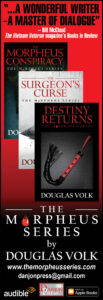Podcast Appearance
If you missed my Oct. 22 guest appearance on The After Show with McKensie Stewart & Amy Shannon, you can listen to a recording of the episode.
Here is the direct link to my appearance on the podcast on BlogTalk Radio.
https://www.blogtalkradio.com/…/10/22/chapter-8-episode-9
The episode has also been uploaded to The After Show’s YouTube page, and the link is:
https://youtu.be/CQEWvMFhUYg
Vietnam Insights
Here’s fascinating, informal website filled with links about the history of the Vietnam War and the tumultuous period in which it was fought. It includes a tremendous listing of Vietnam-related books and a lot of other historical material.
www.vietnamwar.net
The site includes a diverse listing of works of Vietnam fiction, filled with titles and descriptions that suggest a lot to explore.
www.vietnamwar.net/fiction.htm
This site appears to be curated by Diana J. Dell, author of A Saigon Party: And Other Vietnam War Short Stories.
I haven’t read this one yet, but here’s the Publisher’s Statement:
A Saigon Party
By Diana J Dell
After her brother Kenny was killed in the Mekong Delta, Diana Dell went to Vietnam with USO. Her short stories are not about battles, blood, gore, or angst. They are about participants of the war other than grunts: war profiteers, disc jockeys, rock stars, landladies, pedicab drivers, movie stars, pickpockets, beggars, journalists, celebrity tourists, and other REMFs. Irreverent, outrageous, cynical, satirical, intelligent, and insightful are a few of the words used to describe “A Saigon Party: And Other Vietnam War Short Stories.”
Here’s a sampling of some of the reviews of A Saigon Party on Amazon.com:
No one is spared in these hard hitting stories.
I spent four years in Vietnam, two as a soldier (MP) and two as a civilian worker so I can relate too much of the dangerous tomfoolery that went on. —J. S.
A Different Look at The Vietnam War Experience
This was a whole lot different than any other book I have read about The Vietnam War experience. This is a view that most of us veterans never got to see while we were in… —W. H. M.
A Saigon Party
Diana Dell is an amazing story teller! I find my self getting lost in her memories so easily. This book isnt your typical “Vietnam” book where all that is talked about… —S. A.
Great Stories!
Since I’m a huge fan of over-the-top fiction, I especially enjoyed “A Pedicab Driver Peddles Through History,” “The Vietnamese Rock Star Interview on AFVN” and “Dan Quayles’ Double.”
TIME’s Nightmare Scenario
Perhaps David Collier’s terrifying “somnambulistic telepathy” in The Morpheus Conspiracy is more real than most would think!
Excerpted from Nightmare Scenario by John Cloud, TIME, July 9, 2012
“Recently, researchers have begun to discover not only that we can learn to have fewer nightmares but also that we can change their content. Because the No. 1 complaint of veterans returning from Afghanistan and Iraq is insomnia—and because so many veterans have nightmares about what they saw in combat—the Department of Defense (DOD) has poured millions of dollars into the study of dreams.
One new theory is that dreams and nightmares aren’t a secondary symptom of mental illness but rather a primary psychological problem. In other words, dreams themselves may cause mental illness, not the other way around.
There’s also the phenomenon of lucid dreaming—being able to realize you’re dreaming and then control the dream as it occurs. From a fellow nightmare sufferer in New York, I had heard about a way to train yourself to dream lucidly—an approach that combines psychological and physiological techniques to enter bad dreams as they occur and rewrite them. It sounded silly, as if someone were trying to turn the movie Inception into real life. But it was also a really cool idea.
If dreams are random physiological events, why can we control their content with IRT (imagery rehearsal therapy)? Imagery rehearsal therapy is simple: you begin by imagining a dream you would like to have. The dream doesn’t have to be some optimistic reverie about puppies and sunshine. You can imagine any dream you want–boring, anodyne, even gloomy—just not your nightmares. You then write down the new one, and every day, you take a few minutes, preferably with eyes closed, to think about that dream.”
Read the entire TIME article






